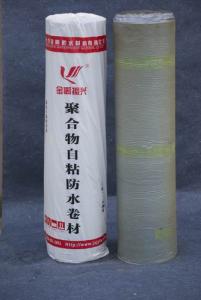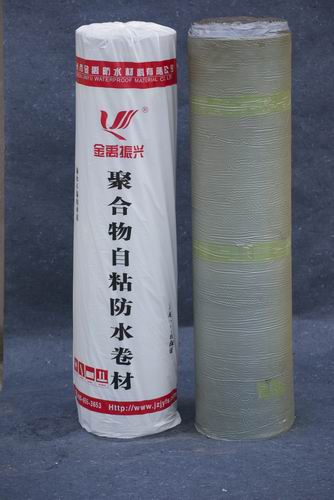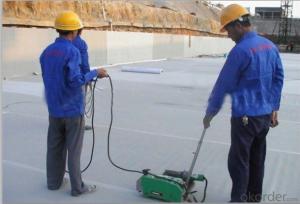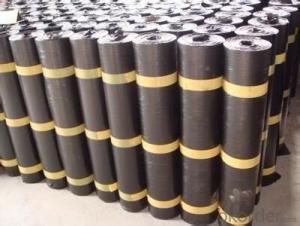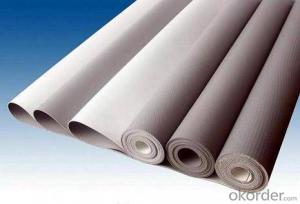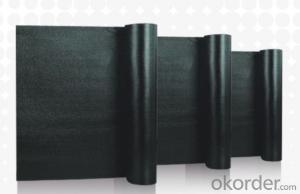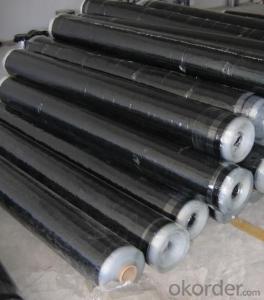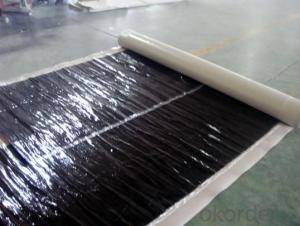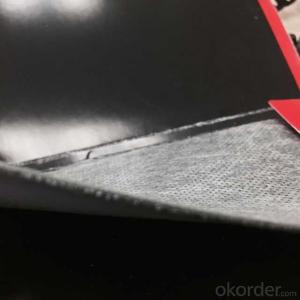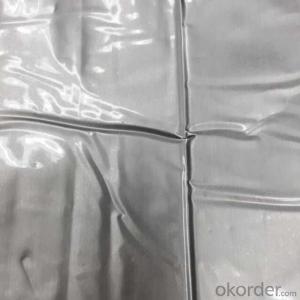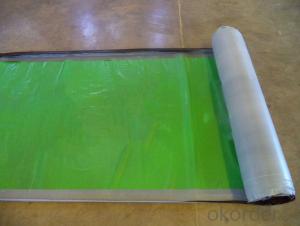self-adhering polymer modified bituminous waterproof membrane
- Loading Port:
- Shanghai
- Payment Terms:
- TT OR LC
- Min Order Qty:
- -
- Supply Capability:
- 150000 roll/month
OKorder Service Pledge
OKorder Financial Service
You Might Also Like
Where to use:
Roofs or undergrounds
Swimming pools, fire pools and reservoirs
Subways or tunnels
Open fires-forbidden construction areas
Cold construction areas
Advantages
Self adhesive, safe and environment-friendly
Goodtensilestrength and elongation
Strong adaptability for substrate shrinkage, deformation and cracks
It will be a high-strength membrane to resist water
Penetration-resisting and corrosion-resisting
Excellent flexibility in low temperature
Strong self healing ability for penetration and cracks
Packaging: JY-100-3 material is packed in rolls with plastic bags or cartons.
Storage: JY-100-3 material should be stored in well-ventilated place and avoid being exposed to the sun or rain. The temperature in stored places can not be higher than 45° C. It should be put vertically not more than in two levels
Transportation: In order to prevent inclination or lateral drift, JY-100-3 material can not be put vertically in double-level
Surface preparation: Surfaces should be dry, clean, smooth and free from any dusts, oil or loose particles. Cracks and uneven places need to be filled by polymer mortar.
- Q: Can a waterproofing membrane be used in mining or excavation projects?
- Indeed, mining or excavation projects can make use of a waterproofing membrane. Such membranes are specifically crafted to thwart the infiltration of water and other liquids, making them a perfect remedy for regions susceptible to water intrusion, such as mines or excavations. Typically, these membranes are fashioned from resilient substances like rubber or bitumen, and they are affixed to the walls, floors, or roofs of these structures to establish an impervious barricade. By employing a waterproofing membrane, mining and excavation projects can diminish the likelihood of water harm, safeguard equipment and infrastructure, and guarantee a secure working environment for laborers.
- Q: Does a waterproofing membrane require any curing time before it can be exposed to water?
- Yes, a waterproofing membrane generally requires a curing time before it can be exposed to water. The specific curing time may vary depending on the product and manufacturer's instructions. It is important to allow the membrane sufficient time to cure and bond properly to ensure its effectiveness in preventing water penetration.
- Q: Can a waterproofing membrane prevent mold and mildew growth?
- Yes, a waterproofing membrane can help prevent mold and mildew growth. By creating a barrier that prevents water from seeping into the walls or floors, it reduces the moisture content in the environment, which is necessary for mold and mildew to thrive. This can effectively prevent their growth and minimize the potential for related health issues and structural damage.
- Q: Does a waterproofing membrane prevent mold and mildew growth?
- Yes, a waterproofing membrane can help prevent mold and mildew growth. Mold and mildew thrive in damp and moist environments, and a waterproofing membrane helps to create a barrier that prevents water from seeping into the surfaces it is applied to. By keeping moisture out, it reduces the conditions that promote mold and mildew growth. However, it is important to note that while a waterproofing membrane can be effective in preventing mold and mildew, it does not guarantee complete protection. Proper ventilation and regular maintenance are also essential in preventing mold and mildew growth.
- Q: Can a waterproofing membrane be used on precast concrete surfaces?
- Precast concrete surfaces, commonly used in construction for walls, floors, and roofs, are prone to water penetration. This can lead to damage and deterioration over time. To address this issue, the application of a waterproofing membrane is recommended. A waterproofing membrane is a thin layer of material, typically made of bitumen, rubber, or PVC, that is designed to prevent the passage of water. By applying this membrane to the precast concrete surface, it acts as a barrier, effectively stopping water from seeping into the concrete. There are several advantages to using a waterproofing membrane on precast concrete surfaces. Firstly, it helps to prolong the lifespan of the concrete by protecting it from water damage. Cracking, reinforcement corrosion, and the growth of mold and mildew can be minimized or avoided altogether. Secondly, the use of a waterproofing membrane improves the overall performance of the precast concrete. By preventing water penetration, the structural integrity of the concrete is maintained. Additionally, it ensures a dry and comfortable environment inside buildings by preventing water leakage. Lastly, a waterproofing membrane provides extra protection against other elements such as chemicals and UV rays. Certain membranes are resistant to chemical exposure, which is advantageous in industrial or commercial settings. Some membranes also possess UV-resistant properties, safeguarding against damage caused by prolonged exposure to sunlight. In conclusion, the application of a waterproofing membrane on precast concrete surfaces is an effective solution to prevent water penetration and safeguard the concrete from damage. It is a cost-effective and efficient method to ensure the durability and longevity of precast concrete structures.
- Q: Are there any specific tools or equipment required for installing a waterproofing membrane?
- Indeed, specific tools and equipment are indispensable when it comes to the installation of a waterproofing membrane. Some of the imperative tools and equipment that one must possess include: 1. Protective gear: To safeguard oneself from any detrimental chemicals or fumes, it is crucial to wear protective gear like gloves, goggles, and a face mask. 2. Cleaning equipment: Prior to the installation of the membrane, it is essential to have a clean and debris-free surface. Hence, one may require a broom, vacuum cleaner, or pressure washer to ensure thorough cleaning. 3. Waterproofing membrane: The appropriate type of membrane is contingent upon the project's requisites. It is vital to possess the right membrane material and sufficient coverage for a proper seal. 4. Primer: In certain cases, the utilization of a primer may be warranted to enhance adhesion between the surface and the membrane. The choice of primer is contingent upon the surface material and type of membrane being utilized. 5. Application tools: These tools are instrumental in the process of applying the membrane onto the surface. Brushes, rollers, or sprayers are some common application tools. The selection of tools is dependent on the type of membrane and the scale of the project. 6. Seam tape: If the waterproofing membrane necessitates seams, the presence of seam tape is vital to ensure an airtight seal at the joints. The tape must be compatible with the membrane material. 7. Adhesive or adhesive tape: Certain waterproofing membranes demand the utilization of adhesive for bonding them to the surface. Alternatively, adhesive tape can be employed for self-adhesive membranes. 8. Cutting tools: Based on the shape and size of the area to be waterproofed, one may require cutting tools such as utility knives or scissors to trim the membrane to the desired dimensions and shape. 9. Caulking gun: A caulking gun is an imperative tool for applying sealant or caulk to fill any gaps or cracks in the surface before the membrane installation. 10. Drying equipment: Following the installation of the membrane, a certain amount of time may be required for it to dry or cure. Depending on the specific membrane and environmental conditions, fans or dehumidifiers may be necessary to expedite the drying process. It is of utmost importance to refer to the manufacturer's guidelines or seek professional advice to ensure that all the necessary tools and equipment are available for a successful installation of the waterproofing membrane.
- Q: Can a waterproofing membrane be used for convention centers or exhibition halls?
- Yes, a waterproofing membrane can be used for convention centers or exhibition halls. Waterproofing membranes are commonly used in construction to protect buildings from water damage and leakage. Given the potential for water infiltration in large spaces like convention centers or exhibition halls, using a waterproofing membrane can help ensure the integrity and durability of the structure by preventing water penetration and potential damage.
- Q: Are waterproofing membranes resistant to frost damage?
- Waterproofing membranes, in general, exhibit resistance towards frost damage. These membranes are specifically crafted to endure diverse weather conditions, which include freezing temperatures. They typically comprise modified bitumen, PVC, EPDM, or TPO, materials renowned for their exceptional frost and environmental resistance. These materials are engineered to maintain their flexibility and elasticity, even in low temperatures, ensuring the preservation of the waterproofing membrane's effectiveness in preventing water infiltration. Furthermore, meticulous installation methods and regular maintenance can augment the waterproofing membranes' resistance to frost damage.
- Q: Can a waterproofing membrane be used in schools or educational buildings?
- Yes, a waterproofing membrane can be used in schools or educational buildings. Waterproofing membranes are commonly used in these types of buildings to protect them from water damage and leakage. By preventing water infiltration, a waterproofing membrane helps maintain a safe and healthy environment for students and staff, preserving the structural integrity of the building and reducing maintenance costs in the long run.
- Q: Can a waterproofing membrane be used on foam block surfaces?
- Yes, a waterproofing membrane can be used on foam block surfaces. The membrane acts as a protective barrier, preventing water penetration and ensuring the foam blocks remain waterproof.
Send your message to us
self-adhering polymer modified bituminous waterproof membrane
- Loading Port:
- Shanghai
- Payment Terms:
- TT OR LC
- Min Order Qty:
- -
- Supply Capability:
- 150000 roll/month
OKorder Service Pledge
OKorder Financial Service
Similar products
Hot products
Hot Searches
Related keywords
